Bernie Sanders: Is his 'revolution' now beyond his control?
- Published
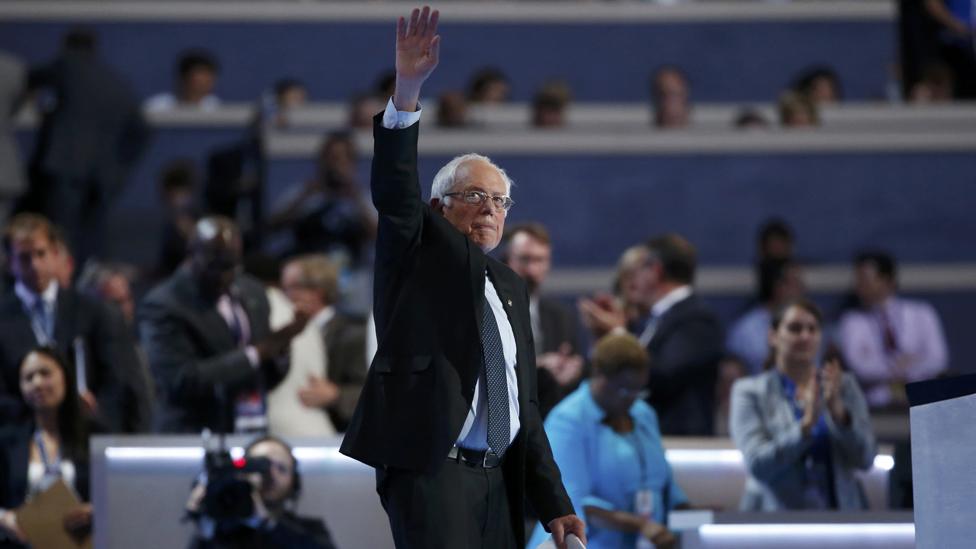
Mr Sanders was booed when he told supporters to back Hillary
Bernie Sanders and his team are saying all the right things for Hillary Clinton.
They support her pick of Tim Kaine as a running mate. They want their delegates on the Democratic National Convention floor to be respectful. They urge the party to rally behind the presumptive nominee.
On Monday night Mr Sanders himself gave the party's standard-bearer everything she could have wanted.
After a rock-star welcome from his legions of supporters in the convention hall, the man who only recently joined the Democratic Party made a whole-hearted pitch for that party's soon-to-be nominee.
"Hillary Clinton must become the next president of the United States," Mr Sanders said to raucous cheers from the Clinton faithful, many of whom had been nervously awaiting this exact moment. "The choice is not even close."
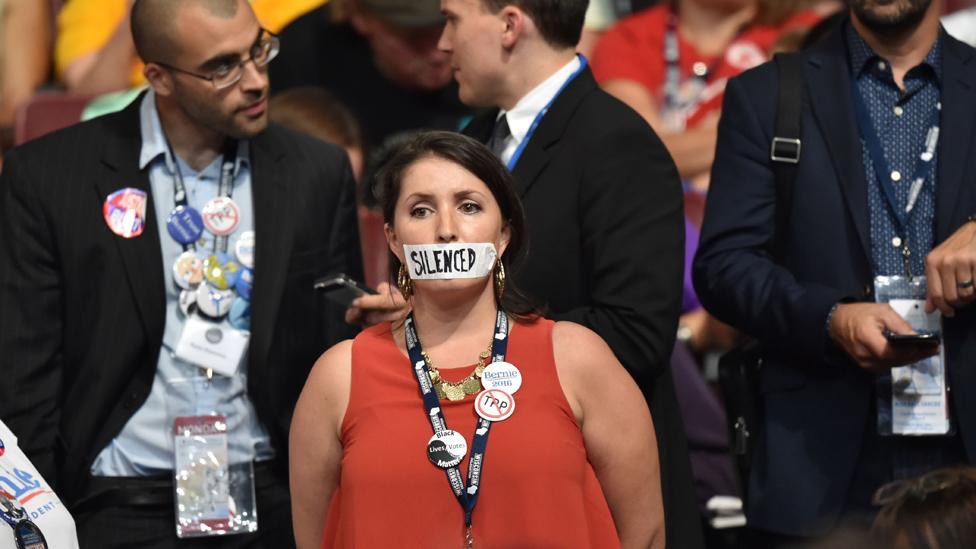
Some of Mr Sanders's supporters say they will not vote Democrat in November
Mr Sanders said he would do everything he could to help her get elected and that she would make "an outstanding president". He drew a sharp contrast time and time again with Mrs Clinton's Republican opponent, Donald Trump.
"This election is about which candidate understands the real problems facing this country and has offered real solutions," he said. "Not just bombast, fear-mongering, name-calling and divisiveness."
More than that, Mr Sanders had a message for his supporters who have said they may not back Mrs Clinton in the November general election; that it's "Bernie or bust".
"If you don't believe this election is important, if you think you can sit it out, take a moment to think about the Supreme Court justices that Donald Trump would nominate and what that would mean to civil liberties, equal rights and the future of our country," he said.
'We won't vote for Hillary'
The problem for Mrs Clinton - and, for that matter, for Mr Sanders - is that Bernie delegates aren't particularly keen on taking orders from anyone, even the man whose campaign brought them all to Philadelphia.
Supporters of Bernie Sanders booed after the senator urged them to support Hillary Clinton
Self-styled revolutions can be unpredictable like that. As French journalist Jacques Mallet du Pan once wrote, they do have a tendency of devouring their children.
After Mr Sanders's speech, Sanders supporters took to the convention halls to chant "We won't vote for Hillary" and "This is what democracy looks like".
Under her breath, one Clinton supporter muttered: "This is what losers look like."
The problem for the Clinton campaign, however, is that the Sanders "revolution" is refusing to acknowledge defeat.
At a Monday afternoon rally Bernie Sanders was booed by his own supporters when he told them to back Mrs Clinton. And that was just a preview of the fireworks that would take place when the convention was gavelled to order.
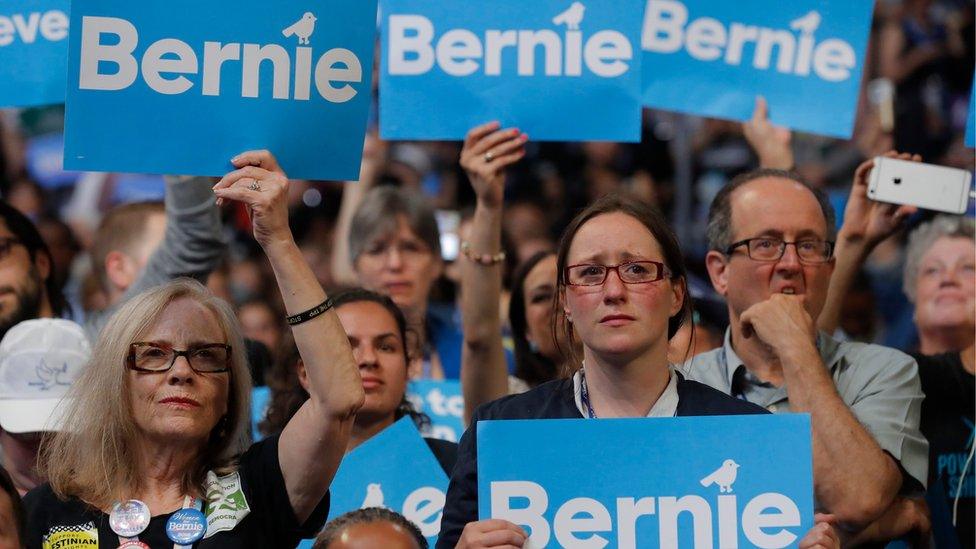
The Sanders revolution is refusing to accept defeat
Speaker after speaker who mentioned Mrs Clinton - even in passing - was jeered. When civil rights icon Elijah Cummings took the stage, the Sanders delegates stood, waved signs and chanted against the proposed Trans-Pacific Partnership trade deal
According to Lauren Steiner, a California Sanders delegate who helped organise the convention-floor demonstration, all of this was planned weeks in advance - in emails, conference calls and in-person meetings. A direct plea via email from Mr Sanders to his supporters, insisting that demonstrations would be counterproductive, was shrugged off.
"Here's the guy that gets arrested protesting segregated housing, and he's telling us not to do a protest?" she asked.
For Ms Steiner and other Sanders delegates, Mr Sanders may have carried their movement for the past year, but the wave he rode will outlive his campaign - and already could be moving beyond his control.
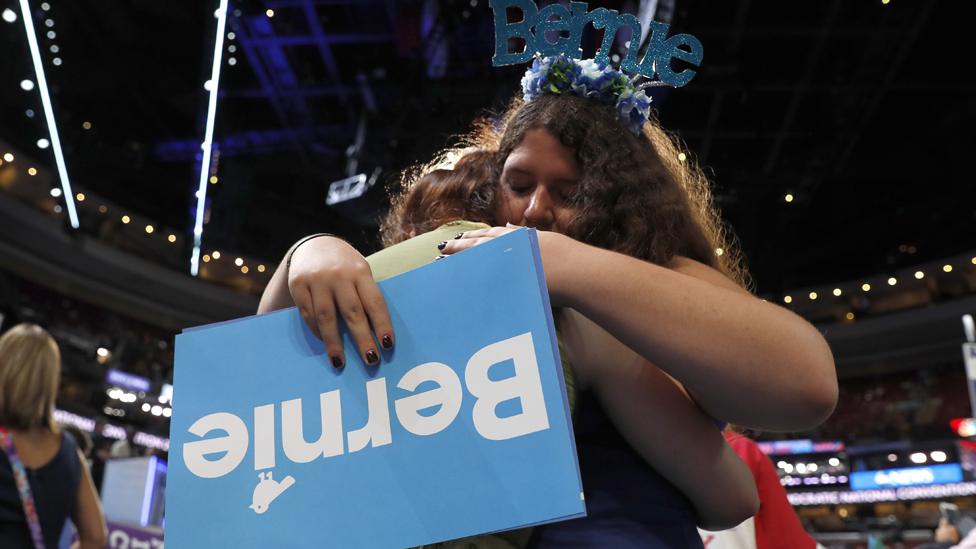
Supporters feel the Bern
"Bernie Sanders's political revolution does not depend on Bernie Sanders or any one person," Steiner said. "It's millions of people getting up and saying enough is enough, this country belongs to all of us."
'Thumbs in our eyes'
Earlier in the day other Sanders supporters from California - a state delegation full of "beautiful troublemakers" in the words of delegate Robert Shearer - spoke about the rocky convention that could be in store for Mrs Clinton.
"We take very seriously the principle Bernie enunciated from early in campaign, that social change comes from the bottom up," said Karen Bernal, one of the leaders of the state's Sanders delegation. "As beloved as Bernie is, he's not running the show."
Norman Solomon, who serves as national co-ordinator of the Bernie Delegates Network, says that more than 80% of the nearly two-thirds of Sanders delegates he polled objected to Mr Kaine, a relative moderate within the party, being the vice-presidential nominee.
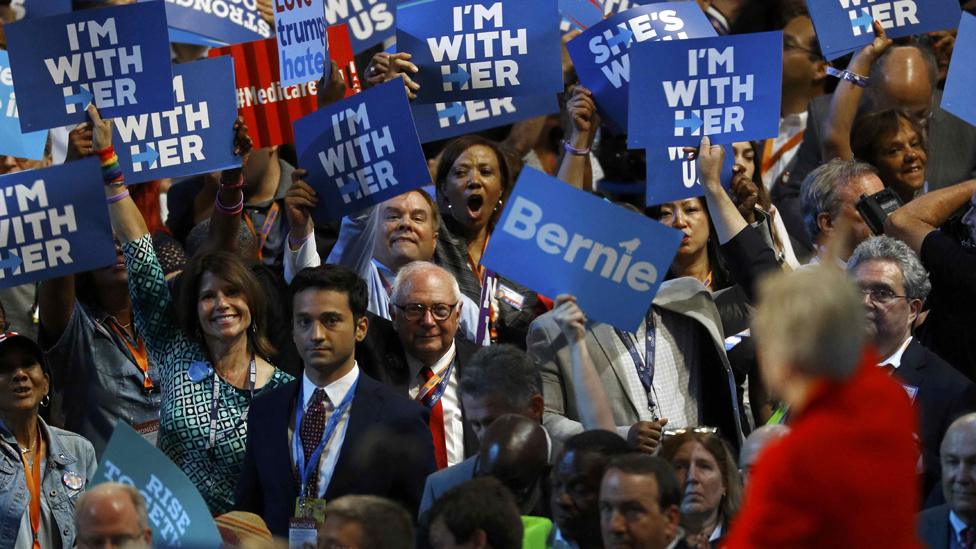
A majority of Sanders supporters nationally have said they will back Mrs Clinton
"Putting him on the ticket is not reaching out," he said. "If that's reaching out, it's political thumbs put in the eyes of Bernie Sanders supporters."
He says a variety of next steps are on the table - including a walkout during Mrs Clinton's Thursday nomination acceptance speech or an attempt to formally offer an alternate to running-mate Kaine on Tuesday.
While a majority of Sanders supporters nationally have said they will back Mrs Clinton, the true believers here - most of whom have paid their own way to the convention hall to cheer their candidate - are a different breed.
At a pro-Sanders rally on Monday afternoon, some demonstrators told the BBC that they wouldn't mind if Mr Trump won - if it opened the door to someone from their movement to rise to the presidency in four years.
It's a prospect Mr Solomon dismisses, however. He says that Sanders supporters in most states can vote their conscience - but in key electoral battlegrounds, they'll "hold their noses" and opt for Mrs Clinton.
It's not exactly the most rousing endorsement, but it may be the best Mrs Clinton can hope for from this crowd - and, thanks in part to Mr Sanders's efforts Monday night, it might be enough.